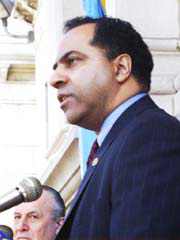After all the hoopla is over regarding the election challenge in the 31st state election district, two central questions remain: Should party primaries be subject to the same contribution limits as general elections? And should a party be restricted from endorsing one candidate in a primary over another?
This dilemma came about by a two-count court challenge that losers in the June Democratic party brought against the winners, hoping to get the court to reverse the results achieved in a voting booth.
The Hudson County Democratic Organization filed the challenge on behalf of Jersey City Councilman L. Harvey Smith and Assembly members Joseph Doria and Elva Perez-Cinciarelli, who were defeated by a slate of candidates that included Jersey City Mayor Glenn Cunningham running for Senate, and former Freeholder Louis Manzo and Anthony Chiappone running for state Assembly.
The HCDO claimed that the Cunningham team had violated the state’s campaign finance laws by moving money in excess of spending limits through two candidate committees, then shared costs among the three candidates to exceed allowing limit for spending.
The second count questioned the validity of 1,700 votes cast.
Cunningham and company won on both counts. But the ruling on campaign financing has left more questions than the case answered.
In ruling that campaign contribution limits only applied to general elections except in the case of gubernatorial races, Judge Arthur D’Italia may have thrown campaign funding restrictions into a legal limbo from which they cannot recover.
Didn’t intend to limit
In his ruling, D’Italia said spending limit laws apply to the general election.
“I do not see anything to suggest the legislature intended to limit spending in the primary,” he said, noting that the party would govern itself in this regard.
Aside from the fact that this foiled the HDCO’s effort to reverse the election results, it also spelled trouble for future elections in that it left party primaries open to big monetary donations, currently restricted under campaign finance laws.
“We believe grave consequence to the body politic in Hudson County, New Jersey in general,” said state Sen. Bernard Kenny, chairman of the HDCO. “In effect, this means the primary of both major parties is not governed by election finance laws.”
This is not quite true, according to Manzo.
“What the judge did is set aside spending limits, but everything would still have to be reported to ELEC,” Manzo said.
The New Jersey Election Law Enforcement Commission (ELEC) – which can issue fines and other penalties for abuses of law – may be part of the appeal since it may find it difficult to determine when a candidate or PAC is in violation and when it is not. “We’ve had our attorneys looking at the ruling,” said ELEC Executive Director Frederick Hermann.
Campaign contribution laws went into effect in 1973.
Kenny predicts primary free-for-all
Kenny, however, said he was upset by the lack of action by the state Attorney General, who he said should have moved quickly to defend the existing election laws – although the Attorney General’s office appears to be joining the HDCO in its appeal of the ruling.
“This ruling is exactly the opposite of what the public tells us they want,” Kenny said. “The public over the years had told us it wants limits on contributions and expenditures.”
Kenny said in Hudson County (as in most of the other counties in New Jersey) there is no real contest in the general election. Since most voters are Democrats in Hudson County, the candidate that wins the June primary usually is part of a party that dominates the general election in November.
“This means that the primary election is the equivalent to the general election,” Kenny said. “The judge made a distinction between the primary and the general election. He told us that a general election is an election to a public office, and that a primary is not. We are contending that you cannot get to the general election without going through the primary elections, so that restrictions should apply.”
Kenny predicted that if D’Italia’s ruling stands, primaries would become “No holds barred, free-for alls with uncontrolled contribution and uncontrolled spending.”
“At the end of it, we will end up with a candidate that has raised the most money and not accountable to the public,” he said.
Kenny said the HDCO intends to appeal the decision. Manzo felt the appeal would not overturn D’Italia’s decision.
Party had advantage, Manzo said
Manzo said the court ruling addresses a historic advantage the HDCO has had over the years. While challengers have been hampered by campaign limits, the HCDO – which technically is supposed to be the arbitrator of the primary, not the backer of any particular candidates – has nearly unlimited financial resources to overwhelm opposition.
“What the court has done is to equal the playing field,” Manzo said. “The court did not overturn reporting requirements. The public will still be able to see just where the money comes from and where it goes.”
Mayor Glenn Cunningham agreed, saying that the restrictions as imposed tied the hands of any challenger and gave the HDCO power in effect to pick anyone it wanted by providing their own pick with unlimited resources.
“This was unfair from the beginning and the case was disparagement to the voters in the 31st District,” Cunningham said. “The lawsuit was undemocratic.”
Cunningham said D’Italia ruled in favor of his team based solely on the information brought to the court by the HDCO.
“The judge dismissed this case before we even put on a defense,” Cunningham said. “The law was on our side and we prevailed.”
In a gesture designed to make peace in the divided Democratic Party, Cunningham said he would be willing to sit down with Democratic leadership and the governor to bring the party together.
“We still have a campaign to run,” he said. “And I head that ticket.”
